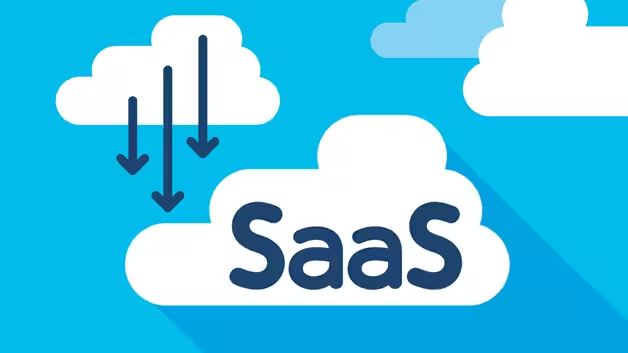What is SaaS (Software as a Service) How to use SaaS in 2023

Cloud computing has transformed the information technology industry by offering firms with a flexible and scalable platform for managing their operations. Software as a Service (SaaS) is a common cloud-based software application delivery mechanism. In this post, we’ll look at What is SaaS in cloud computing. Its advantages and how it can assist your organisation.
Table of Contents
What is SaaS in Cloud Computing?
SaaS is a software delivery model in cloud computing in which applications are hosted by a third-party provider and provided via the internet. In other words, because the programme is hosted on the provider’s servers, users do not need to install or maintain it on their own machines. Because SaaS applications are accessed via a web browser or API, they are simple to use and accessible from any device with an internet connection.

Benefits of SaaS in Cloud Computing
One of the primary advantages of cloud computing SaaS is that it removes the need for organisations to invest in costly hardware and infrastructure. With SaaS, the supplier handles all technical concerns like as updates and maintenance levels, allowing businesses to concentrate on their main tasks. This also implies that organisations may swiftly scale up or decrease their usage based on their needs. Without having to worry about the expenses and difficulties of adding hardware.
Other One
Another advantage of cloud computing SaaS is that it allows enterprises to access advanced computer programmes that could have been too expensive or hard to develop on their own. SaaS companies often provide a wide range of software programmes. Ranging from basic office applications to highly specialised software for industries like healthcare or finance.
How SaaS in Cloud Computing Works
In cloud computing, SaaS works by hosting software applications on the service provider’s servers and delivering them via the internet. The applications are accessed by users via their web browsers or an API, having the provider managing all technical issues like as updates and maintenance. Typically, the provider demands an annual or monthly charge depending on usage, with prices determined by factors such as the quantity of users and their level of functionality.
Advantages of SaaS in Cloud Computing
Scalability and Flexibility
Scalability and flexibility are two of the key benefits of SaaS in cloud computing. Businesses may easily and quickly scale either increasing or decreasing how they use it as needed, without having to worry about the expenses and logistics of adding gear. This is especially valuable for organisations that undergo seasonal swings in demand, such as companies in the commerce or hotel industries.
Cost Savings
Another benefit of cloud computing SaaS is that it removes the need for organisations to invest in costly hardware and infrastructure. With SaaS, the supplier handles all technical concerns like as updates and maintenance, allowing businesses to concentrate on their primary business activities. This also implies that firms may decrease the upfront costs of traditional software products, such as licencing and installation fees.
Access to Advanced Software
In cloud computing, SaaS allows businesses to gain access to advanced software programmes that would be otherwise too expensive or complex for them to use on their own. SaaS companies often provide a wide range of software programmes, ranging from basic tools for productivity to highly specialised software for industries like health or finance. This can help firms stay competitive by providing access to cutting-edge technology without requiring major investment.
Drawbacks of SaaS in Cloud Computing
Data Security and Privacy Concerns
Data security and privacy are two major concerns of SaaS in cloud computing. Businesses must guarantee that their personal information is securely stored as well as that they have authority over who has access to it. Businesses that use SaaS rely on a third-party supplier to keep their data, which might pose security problems. Businesses should thoroughly select SaaS suppliers and guarantee they have adequate security mechanisms in place to mitigate this risk.
Reliance on Third-Party Providers
Another disadvantage of SaaS in cloud computing is that enterprises must rely on third-party vendors for software applications. This can lead to a sense of dependence on others, as organisations rely on the supplier to keep the applications up and running at all times. If the provider encounters technical difficulties, the business’s operations may suffer.
Limited Customization
Because SaaS applications have usually been created to be used by a diverse range of businesses, they might not be modified to meet the particular demands of any one of them. This can be a disadvantage for companies that demand highly customised software applications because they may be unable to find a SaaS supplier that suits their requirements.
SaaS Cloud Service Providers

Cloud computing SaaS (Software as a Service) is becoming increasingly popular among organisations of all kinds. As a result, the market is flooded with SaaS cloud providers. Here are some of the best SaaS cloud providers to think about:
1. Salesforce:
Salesforce, well known for its CRM (customer relationship management) software, thereby is a significant SaaS provider that provides a variety of software programmes for sales, marketing, and support for customers.
2. Microsoft Office 365:
Microsoft’s SaaS solution includes a package of popular products that includes Word, Excel, and PowerPoint, as well as cloud storage via OneDrive.
3. Google Workspace:
Google Workspace, originally referred to as G Suite, is a suite of productivity and collaboration applications that includes Gmail, Google Drive, Google Docs, and Google Sheets.
4. Dropbox:
While Dropbox is best known for its online storage service, it also provides a variety of cloud-based apps for teamwork and project management.
5. Zoom:
The use of video conferencing is now vital for many firms as remote work has grown in popularity. Zoom is a renowned for its video conferencing and classroom SaaS company.
6. HubSpot:
HubSpot provides a collection of software-as-a-service tools for online sales, marketing, and customer service. It provides CRM, automation for marketing, and aid for customers tools.
7. Shopify:
Shopify is a popular SaaS supplier for e-commerce for businesses wishing to sell things online. Its platform includes tools for setting up and running an online store, accepting payments, and keeping track of inventory.
AWS (Amazon Web Services), becoming one of the leading cloud computing platforms, provides a diverse set of SaaS apps and services for organisations, such as managing databases, analytics, and storage options.
Adobe Creative Cloud is a prominent SaaS supplier for enterprises that demand creative software tools. Popular apps like as Photoshop, Illustrator, and InDesign are included, as with video editing tools such as Premiere Pro and After Effects.
10. Slack:
Slack is a communication and collaboration platform that includes capabilities such as chat rooms, sharing of files, and interfaces with other applications that use software. It is another famous SaaS provider for remote teams.
11. Atlassian:
Atlassian provides software creation teams with a suite of SaaS apps, including project management, cooperation, and problem tracking tools.
12. Oracle:
Oracle, best known for enterprise-level software solutions, now provides a variety of SaaS apps for businesses, such as financial administration, personnel, and consumer administration.
When choosing a SaaS cloud provider, consider factors like the provider’s credibility safety precautions, and support offerings. Additionally, businesses should think about the provider’s application’s scalability and flexibility, as well as any possible integration options with current software systems. Companies may effectively harness the potential of cloud computing to promote growth and success by carefully considering these characteristics and picking an online service provider that corresponds with their company goals.





